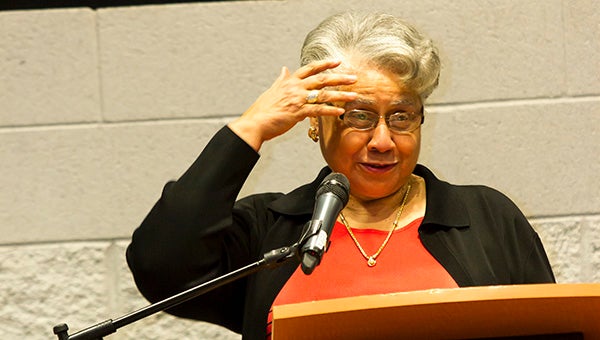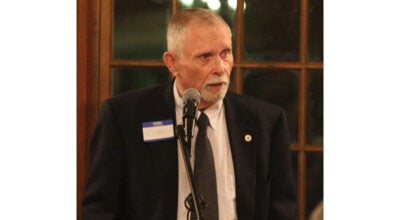Franklin honors Coretta Scott King on MLK day
Published 12:10 am Saturday, January 24, 2015

Juanita Smith, formerly of the Department of Defense, said that she and her gray hair are going to share some wisdom about leadership and Coretta Scott King. Cain Madden | The Tidewater News
Franklin
Looking back on pictures and video from Dr. Martin Luther King Jr.’s role in the American Civil Rights Movement, Juanita Smith of Newport News said that she made the mistake of just seeing Coretta Scott King as part of the scenery.
“I always thought she was just a pretty face, almost like a Mona Lisa,” the retiree from the Department of Defense said. “I think I was almost indifferent, I just saw her. But now, I realize, she had a lot going on.”
When Smith was tasked with giving a Woman’s Day history speech, the person that came to her mind was Coretta King. So on that whim, she decided her presentation would be on the late wife of the Rev. King.
The only problem was that Smith knew next to nothing about her.
“I had to research her and I got caught up in how little I knew about her,” she said. “When I started to do the research, something happened to me — I became intoxicated by her. I never thought of her; and now, I’m not in love with her, but I really like her.”
Smith said she liked to think of King as if she were still alive today, adding that she’d be 88.
“I’ve got 20 minutes, and let me tell you, you can’t say nothing in 20 minutes,” she said with a laugh, and ended up taking more than 30 minutes. “What I hope to do, however, is squeeze in two or three nuggets out of her life to hopefully inspire you to do what I did. All you have to do is Google it, and you can get lost for hours and hours.”
Being married to an icon, Smith said, is a challenge in its own right, but Coretta Scott King contributed far more than that.
“In the frame, you are never in the center of the picture — you are always one or two steps to the right,” she said. “But she was a leader in her own right.”
King was born in Heiberger, Alabama, and Smith said that fact gave her a chance to get to know her to a degree. You see, Smith’s husband is from Marion, Alabama, and they went to the same high school, Lincoln Normal School. This was a congregational school, as back in the 1940s sixth grade was as high as you could go in Alabama’s public education system. From there, you had to pay, and Lincoln School was supplied by the American Missionary Association to help keep tuition low for African-American students.
One of the things Smith’s husband remembers most about her was her operatic voice. King used to sing in the school’s choir, which sang to raise money for the school.
“When he talks about her singing, I could really get jealous — because he closes his eyes,” Smith said with a laugh.
In 1945, King graduated valedictorian from her class and went on to attend Antioch College in Yellow Springs, Ohio. King’s sister, Edythe, was the first African-American student to attend the college on a completely integrated basis. King followed in her footsteps as part of the Interracial Education program, which aimed to give non-white students full scholarships to help diversify the campus.
There, she took one of her first steps in leadership. Majoring in education, King was not allowed to do her student-teaching in the schools in the city. Not because the students were all-white, but rather because the faculty there was all-white, and they refused to admit her into the program. Instead, they wanted her to travel 15 miles down the road to do her student teaching at an all-black school.
“She went to the president of the school, and said this was not right,” Smith said. “She didn’t win that fight, but you don’t win all fights in the first battle.”
After Antioch, King attended the New England Conservatory of Music in Boston, where she would meet her future husband. But first she had to pay for it — her scholarship did not cover room and board.
“She ended up getting free room and board by cleaning up the third floor in the boarding house where she lived,” Smith said. “She was on the floors, singing opera. And that’s OK, as long as you know you are not going to stay on your knees forever.”
While she was there, Martin Luther King was working on his doctorate.
“Her first reaction to him was, ‘He is real short,’” Smith said with a laugh. “But she started going out with him anyway.”
After a period of time, they were engaged. But what they didn’t know, is that back in Atlanta, King’s family had another woman picked out for him to marry.
“Daddy King was really giving her a hard time,” Smith said. “But she got herself together and said, ‘I’ve got qualities, too.’ And they ended up getting married.”
Smith said King was a big part of the Civil Rights Movement, and in the end, she’s a big reason why we celebrate Martin Luther King Jr. Day.
“I can’t say it is totally because of her, but her fingerprint is placed firmly on it,” Smith said. “It took 15 years of going to Congress, and she never gave up on that idea.”
King was also a speaker in her own right, though Smith said she was more soft-spoken.
“She was almost delicate, but she had something to say,” she said.
Fifty years ago, Coretta Scott King was not just talking about discrimination and affirmative action, but she was also speaking about gun control, domestic violence, gay rights and women’s rights.
“Literally, it sounds like you are picking up the paper this morning,” Smith said. “You start reading, and you are like, ‘This could have happened yesterday.’”
At the commencement speech of Antioch, which was founded by Horace Mann, he would say, “Be ashamed to die until you have won some victory for humanity.”
“You can’t just live your life for yourself,” Smith said. “Your life has to include a conscious decision that life is not just about me, but that I must touch someone else’s life.
“She does not have to be ashamed to die,” Smith said of King, “because she did so much for humanity.”





